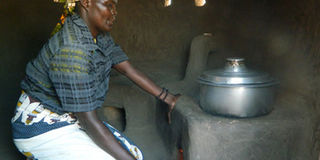Refugees use improved stoves to conserve environment

Resourceful. A woman prepares a meal using Rocket Lorena stove in Ukusijoni Sub-county, Adjumani District, on December 17, 2018. PHOTO BY BILL OKETCH
What you need to know:
- A shortage of fuel for cooking is one of the many problems faced by people in Uganda, especially those hosting refugees.
Adjumani. Refugees and host communities in Adjumani District are using improved stoves called Rocket Lorena to conserve fuel as well as the environment.
The influx of refugees in Adjumani District has put a lot of pressure on the environment.
So far, more than 200,000 refugees have fled their home country – South Sudan and settled in the area. And as a result, the demand for firewood and poles for construction has increased.
Many people have also resorted to charcoal burning as a coping mechanism to be able to earn income.
Adjumani District Development Plan (2017-2020) noted high rate of deforestation, bush burning and poor hygiene among the refugees and host communities.
Today, more than 99.7 per cent of the population in Adjumani use wood fuel. According to Adjumani District Development Plan, this is dangerous to the environment.
Refugees and host community with support from donors are tackling this issue through the use of more fuel-efficient stoves – Rocket Lorena. The stoves are both affordable and easy to use.
The improved stove has high sides which aid heat transfer.
So far, more than 25,000 households in Dzaipi, Pakele and Ukusijoni sub-counties in Adjumani District have benefited from the intervention.
By using clay, organic materials such as chopped grass, sawdust and chopped banana leaves, the stove can be made easily.
Ms Rose Ajio Ondoga of Ukusijoni Sub-county, who has been using the stove for the last six months, shares her experience.
“In fact, it’s the best because it saves fuel, environment and saves lives,” Ms Ondoga said.
Members of the community have been trained to use the stoves and they are now able to teach others.
Essential fuel saving tips such as using dry wood, pre-soaking beans before cooking, using a weighted lid and controlling the air supply to the fire are included in the training package.
“And as a project, we felt that there was need to also support in tree planting such that we are able to replace some of the forest covers that have been lost,” says Ms Jesca Alanyo, the Livelihoods Coordinator in Adjumani District.
“We are in the process of raising tree seedlings that we believe eventually will be planted.”
Common problem
A shortage of fuel for cooking is one of the many problems faced by people in Uganda, especially those hosting refugees.
Gathering firewood is generally women or children’s work but is fraught with dangers; they gamble with the risk of abuse and life threatening attacks during their search for the firewood.
In certain areas, local sources of firewood are completely depleted, leading women to travel further to dig up tree roots, eliminating any chance of trees growing again.
Even if women survive this, they are still exposing themselves and their children to potentially deadly smoke fumes.
Background
The influx of refugees in Adjumani District has put a lot of pressure on vegetation. So far, more than 200,000 refugees have fled their home country – South Sudan and settled in the area. As a result, the demand for fuel wood and poles for construction has skyrocketed.




